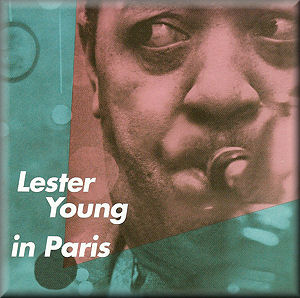1. I Didn't Know What Time It Was
2. Oh Lady Be Good!
3. Almost Like Being In Love
4. Three Little Words
5. I Cover the Waterfront
6. I Can't Get Started
7. Indiana
8. Pennies From Heaven
9. New D.B. Blues
10. Lullaby of Birdland
11. There'll Never Be Another You
12. Tea For Two
13. Introduction by Norman Granz
14. Up 'n Adam
15. I Cover the Waterfront
16. Lester Leaps In
17. Birk's Works (The Modern Set)
Lester Young - Tenor sax
Rene Urtreger - Piano (tracks 1-12)
Jimmy Gourley - Guitar (tracks 1-12)
George Joyner - Bass (tracks 1-12)
Kenny Clarke - Drums (tracks 1-12)
Oscar Peterson - Piano (tracks 14-17)
Herb Ellis - Guitar (tracks 14-17)
Ray Brown - Bass (tracks 14-17)
J. C. Heard - Drums (tracks 14-16)
Dizzy Gillespie - Trumpet (track 17)
Louie Bellson - Drums (tracks 17)
This is a reissue of what was probably the last studio album that Lester Young made. It was recorded in Paris on 2 March 1959, shortly before Young returned to the USA where he died on 15 March. He was already a very sick man when he recorded these tracks, yet they are still recognisable as the Lester as we always knew him. His playing often had an almost sleepy air about it and that relaxation is evident here. Lester doubtless felt more at ease in Paris than he had in the USA, where he had endured various indignities, and this is a tranquil session of easy-going jazz.
This is not to say that Lester is slacking - indeed, in a tune like Oh, Lady Be Good!, he is improvising right from the very start - alluding to the melody but not tied down by it. On several tracks he seems to be toying with tunes - exploring their outer edges and possibilities. His technical ability was undoubtedly diminished but he still manages to produce solos of often surprising invention.
He is well supported by the backing quartet - especially American guitarist Jimmy Gourley, who not only supplies some radiant solos but listens closely to Lester. For example, at the end of Three Little Words, he catches on to and echoes the unexpected direction of Lester's coda. The other outstanding musician is drummer Kenny Clarke, who drives the faster numbers vigorously and adds plenty of imaginative solos.
The original dozen tracks are supplememented by four recorded at Carnegie Hall - three in 1953 and one in 1955. These were organised by Norman Granz and put Lester with the Oscar Peterson Trio plus either drummer J. C. Heard or Louie Bellson. The last track adds Dizzy Gillespie, who brings his characteristic exuberance. These recordings reveal a more vigorous Lester Young, albeit still relaxed. Oscar Peterson always seemed the perfect accompanist for him, as in The Astaire Blues which I well remember as a noteworthy 10-inch LP. The recording here is clear but the audience is slightly too raucous in its enthusiasm, particularly when Lester plays the same note several times - a device always calculated to arouse a JATP audience.
The Paris album has been criticised for showing Lester in decline but he never needed showy playing to impress: he could still make a single note the epitome of jazz emotion.
Tony Augarde
